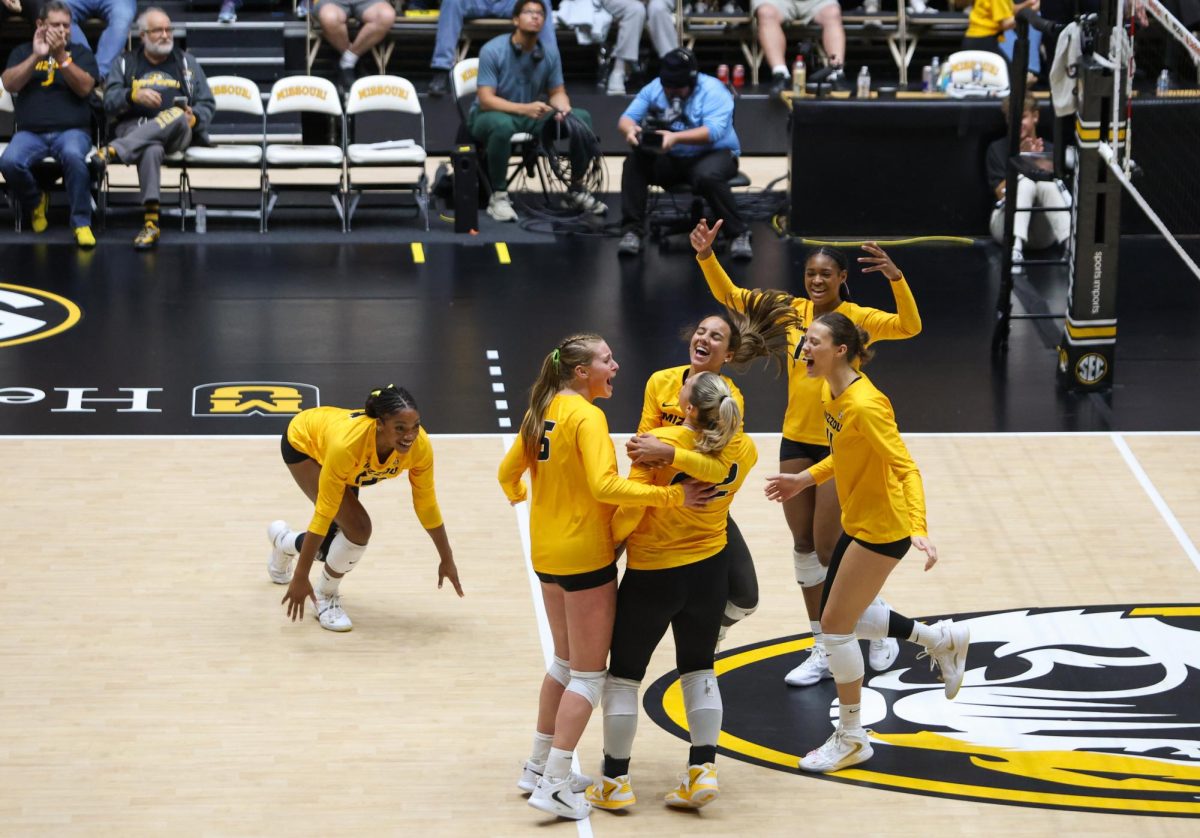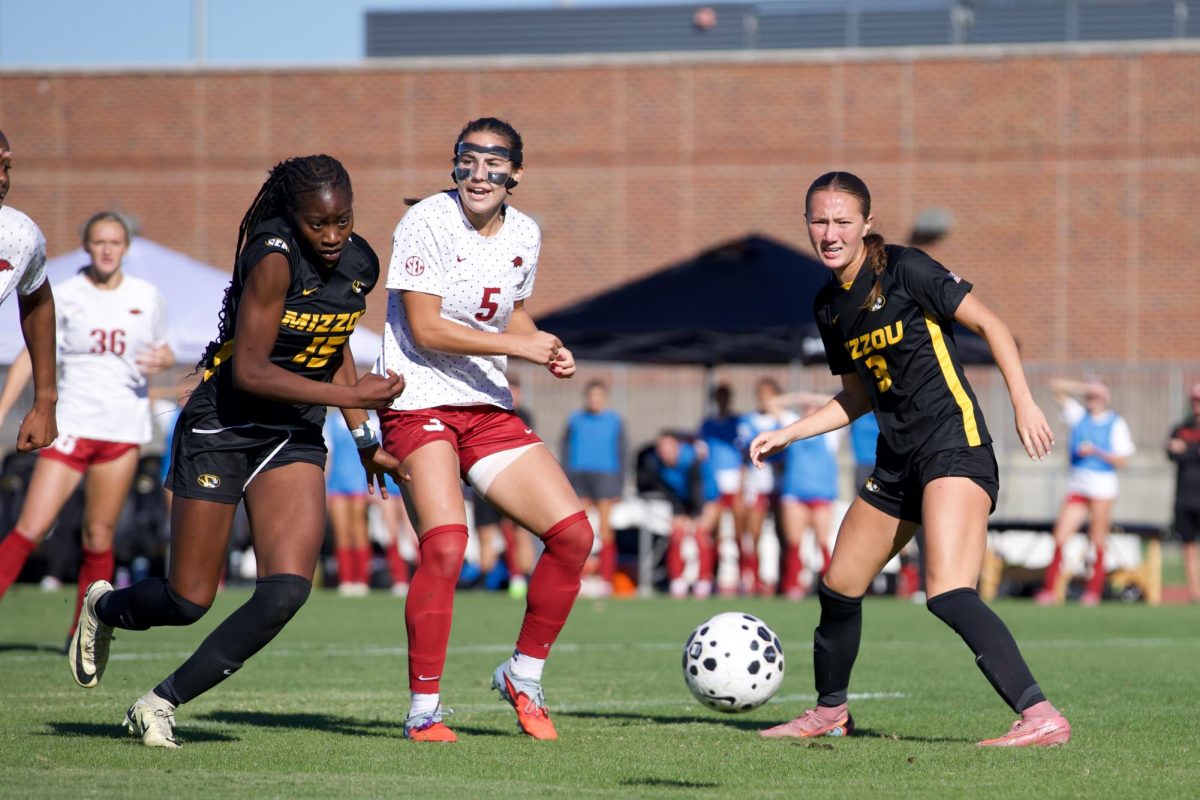Candace Johnson has fans in faraway places.
They go by Faith and Phyllis and Violet and dozens of other names, and they spend most days dancing and singing in a rural village shielded by mosquito nets just outside the hills of Kampala, Uganda. In their world, houses are made of concrete, and cellphones don’t exist. Many are either orphaned or double-orphaned, collateral damage from the country’s ongoing plights with civil war and AIDS. In their spare time, they cheer for the Tigers while watching for lions.
“These kids have nothing, and they will come up to you and smile and ask about your family,” Johnson said on a chilly October morning in Columbia, some 8,000 miles away. “They remember every detail about you — what you like to do, what you don’t like to do.”
Johnson, a freshman defender on Missouri’s soccer team, will talk to those with access to Facebook, and the first thing they’ll do is ask about soccer. Or school. Or her sisters. And she’ll realize their inquiries are sparked by their genuine curiosity fueled by admiration and goodness.
“I learned that I can’t complain about anything,” she said. “I’m so blessed in every way, and I’m grateful to them for showing that to me.”
Johnson calls these kids her inspiration. She met them last November when she was still a senior at Ursuline Academy in Dallas, Texas, leaping for headers and clearing balls for one of the nation’s premier high school soccer teams. It was at the time Empower African Children, a nonprofit organization based in Dallas, decided to open one of its missionary trips to high school students.
Empower African Children strives to help students in Africa focus on the future rather than the losses in their past. Its goal is to help underprivileged children break free from their environments instead of being defined by their usually impoverished circumstances and often tragic narratives. In November 2011, Johnson and nine of her classmates at Ursuline traveled halfway across the world to help them do that.
“That’s something I want to do with my life: help kids and do what I can,” Johnson said. “Going to Uganda would be a chance to do that. So why not?”
While in Kampala, the group stayed in a hotel with a roof but unusable tap water. For two weeks they skipped classes — and in Johnson’s case, soccer — for the churches, homes and orphanages of the region. There, they spoke to people and supported them. They helped take care of the younger children and shared their stories with the older ones. They met the U.S. Ambassador. They helped people live.
“Meeting those kids and keeping those relationships showed me that that’s what I feel like I’m called to do,” Johnson said. “I always had a smile on my face 24/7. There was no downside.”
If Johnson missed soccer during those two weeks abroad, she’s more than made up for it in her first year at Missouri. The freshman defender has played 1,146 minutes — 97 percent of the season — so far on the Tigers’ dominant back line, proving to be an integral part of a group that’s given up just seven goals in 14 matches. Learning alongside upperclassmen Allison Hu and Danielle Nottingham, Johnson has meshed seamlessly into coach Brian Blitz‘s four-back system, which has stifled opposing offenses and is a main reason Missouri sits tied atop the SEC East at 7-1.
“There are areas you can’t find (out) about a kid by just watching them on the soccer field,” Missouri assistant coach Todd Shulenberger said. “Getting to know the individual, that’s what recruiting is about. And what’s huge is getting a good kid with all-around great character.”
Blitz and his coaching staff said Johnson’s impressive play on the field is related to her impressiveness off it, and they considered both when recruiting her last year.
“When you look at the bigger picture, I thought (her work overseas) made her a better person and a better player,” Blitz said. “I thought it would translate to her impacting our team in a positive manner.”
Johnson and her teammates had just finished a grueling two-hour practice on a brisk Tuesday morning in October and were rewarding themselves with an extra long post-workout stretch session. Howls of laughter rang from the turf — the girls half stretching their legs, half rolling around in contorted balls of smiles. Sprawling backward on her foam roller, Johnson’s in the middle of it all: the winning, the stories, the goofing. Yet minutes later all she can talk about is a woman named Maureen.
Maureen was 23 last November, Johnson said. She had already graduated from secondary school and was in her first year of university. Johnson met Maureen at her house, a one-room concrete dwelling the size of a residence hall bathroom that fits five beds.
Maureen, her mother, grandfather, aunt and two cousins live in that one-room home. When the missionaries showed up, they were greeted with the grand tour along with rice and nut packages made and handed out by Maureen’s mother, Johnson said.
“She was so excited to show off her house,” Johnson said. “That was the most humbling thing ever.”
The Uganda trip wasn’t Johnson’s first time helping the less fortunate. In July of last year, she went on a humanitarian mission to Costa Rica, where she cleaned up natural areas and raised school supplies. She has also worked with children who have disabilities at schools back home in Texas. Her volunteer work is based in her heart, validated by her faith, and has shaped what she wants to make of her future. Currently majoring in biological sciences, Johnson is thinking of minoring in human development and family services in order to research autism or work with children in special education.
“Anything I can do to help kids who are less fortunate and make a difference in their lives,” she said. “Because that’s what I love to do, and that’s what I feel like I should do with my life.”
Shulenberger said Johnson has an impressive confidence. He said that she’s very intelligent and is a “quiet leader.”
That might be true when it comes to soccer, but not when the topic of her missionary work is brought up. Not when she’s thinking about Maureen or Faith or Phyllis or Violet, or about one-room homes built on dirt half a world away. Then, it’s different.
“I could talk about them all day,” she said.







